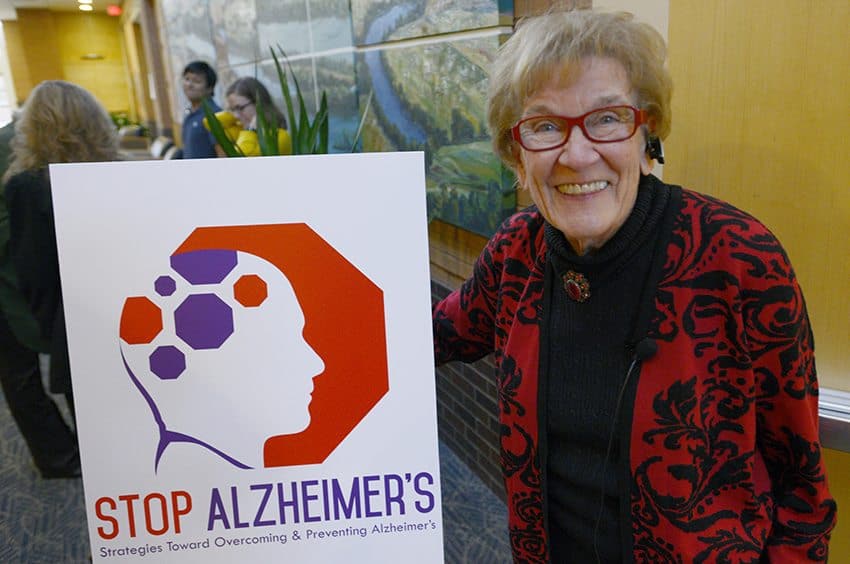UAMS’ Sue Griffin, Ph.D., Awarded $10 Million by NIH for Alzheimer’s Research
| Oct. 5, 2016 | Sue Griffin, Ph.D., an internationally known Alzheimer’s disease researcher at the University of Arkansas for Medical Sciences (UAMS), leads a team that has received a five-year, $10 million grant from the National Institutes of Health (NIH) to study the causes and possible treatments for Alzheimer’s disease.
Griffin said the research team has provided hints that Alzheimer’s is linked to obesity and type-2 diabetes via deficiencies in the way brain cells break down excessive or damaged proteins. A key aspect of the grant will be to design drugs that will counteract these deficiencies and thereby counteract the ravages of Alzheimer’s disease.
She is the Alexa and William T. Dillard professor in geriatric research and director of research at the UAMS Donald W. Reynolds Institute on Aging.
“It really is a pivotal place for us here in Arkansas because we have so many risk factors for the development of Alzheimer’s disease,” Griffin said. “The state is first in obesity, fifth in type 2 diabetes, and has other problems associated with increased risk for Alzheimer’s disease, such as educational opportunities.”
The grant is a renewal of funding that has been continuous since 1995 for the research program and has been led by Griffin since its beginning.
“This grant ensures Dr. Griffin and her team will remain engaged in the important, innovative work they are doing to better understand the causes of Alzheimer’s disease and, with that understanding, develop more effective
treatments for it,” said Jeanne Wei, M.D., Ph.D., the Director of the Reynolds Institute. “The research program has made tremendous contributions to the body of knowledge about the disease. This grant recognizes that achievement and makes it possible to build further on it.”
Griffin has made groundbreaking contributions in the study of Alzheimer’s disease and other neurodegenerative conditions. Her pioneering work includes discovery of a type of inflammation in the brains of Alzheimer’s patients. Griffin went on to show how this inflammation contributes to the formation of amyloid plaques, neurofibrillary tangles, and Lewy bodies in the brains of persons with Alzheimer’s and Parkinson’s disease. She also found connections of these inflammation-related events to genetic differences that confer greater risk of the disease in certain individuals.
Also on the research team are Steve Barger, Ph.D., Professor in the Departments of Geriatrics, Neurobiology & Developmental Sciences, and Internal Medicine; Peter Crooks, Pharm. D., Chair of the Department of Pharmaceutical Sciences in the College of Pharmacy and an Arkansas Research Alliance Scholar; and Robert Shmookler Reis, D.Phil., Professor in the Departments of Geriatrics, Biochemistry/Molecular Biology, and Pharmacology/Toxicology.
“It’s a big collaborative grant, and the work each of us is doing melds together so well,” Griffin said. “It’s all directed at discovering how Alzheimer’s disease works, the genetics that factors into that and the metabolic aspects of people’s lives. The grant will foster collaboration between us and the clinical faculty that will allow us to work toward drug trials.”



